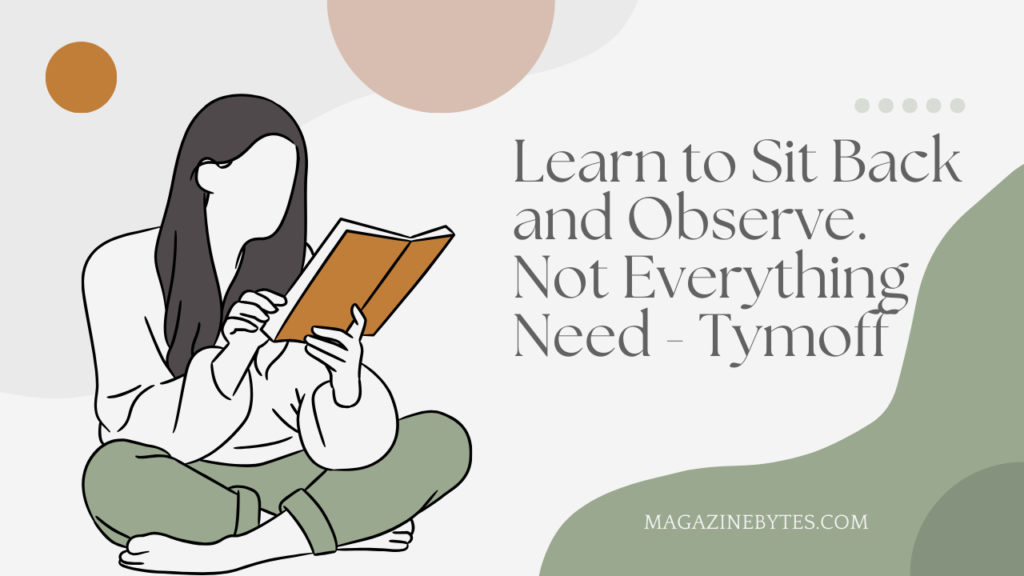
Understanding the Quote
The quote “Learn to sit back and observe. Not everything needs—Tymoff” carries a profound message about the importance of mindfulness and the power of observation in daily life. This idea emphasizes that not every situation requires an immediate reaction. By pausing and observing, we can gain valuable insights and respond more thoughtfully and effectively.
Core Message
Pausing and Observing
The core message of this quote is about the importance of pausing and observing situations before reacting. In our fast-paced world, the tendency to react immediately can often lead to unnecessary stress and conflict. By stepping back and observing, we can gather more information and better understand the situation.
Selective Responses
The quote also highlights the significance of selective responses. Not every situation demands an immediate or vocal reaction. Sometimes, the best response is silence or a thoughtful pause. This approach can prevent misunderstandings and hasty decisions that must be made with better knowledge.
Benefits of Pausing and Observing
Reduced Stress
One primary benefit of learning to sit back and observe is reduced stress. Impulsive reactions often lead to regret and increased tension. By taking a moment to breathe and assess the situation, we can approach challenges with a calmer mindset, reducing overall stress levels.
Improved Decisions
Observation allows us to gather comprehensive information, leading to better decision-making. When we take the time to understand the full context, our responses are more likely to be effective and appropriate. This approach enhances our ability to solve problems and navigate complex situations.
Greater Self-Awareness
Pausing and observing also fosters greater self-awareness. It provides an opportunity to reflect on our emotions and triggers. Understanding our reactions helps us manage them better and interact more harmoniously with others.
Also Read: It Is Not Wisdom But Authority That Makes A Law. T – Tymoff
Practical Applications
In Disagreements
It is easy to get caught up in the heat of the moment during disagreements. However, stepping back to observe the other person’s perspective can lead to more constructive conversations. By listening actively and responding thoughtfully, we can resolve conflicts more effectively.
At Work
Challenges and conflicts are inevitable in professional settings. When faced with a difficult situation at work, pausing to assess the problem can lead to better solutions. Observing the dynamics and considering various perspectives before reacting can enhance teamwork and productivity.
Everyday Interactions
The habit of observation can be invaluable in everyday interactions. We can communicate more effectively by paying attention to social cues and body language. This mindfulness helps avoid unnecessary interruptions and promotes better understanding in conversations.
Cultivating Mindfulness
Practicing Patience
Cultivating the habit of sitting back and observing requires patience. It involves resisting the urge to react immediately and allowing ourselves the time to process information. This practice can be developed through mindfulness exercises and conscious effort.
Building Emotional Intelligence
Observation enhances emotional intelligence by helping us understand our emotions and those of others. This understanding improves our ability to empathize and connect with people on a deeper level.
Conclusion
The quote “Learn to sit back and observe. Not everything needs—Tymoff” offers a valuable lesson in mindfulness and thoughtful response. By embracing this approach, we can reduce stress, make better decisions, and improve our self-awareness. Observation can lead to more meaningful and effective interactions in various aspects of life, from personal relationships to professional settings.
Implementing the Approach
Daily Practice
Incorporating this approach into daily life can start with small steps. Practice pausing and observing in routine situations, such as during conversations or making decisions. Over time, this habit can become a natural part of your response mechanism.
Reflective Journaling
Maintaining a reflective journal can help reinforce the habit of observation. By writing down your experiences and reflecting on your reactions, you can gain deeper insights into your behavior and make conscious improvements.
Encouraging Others
Leading by Example
Encouraging others to adopt this mindful approach can begin with leading by example. Through your actions, demonstrate the benefits of pausing and observing, and share your experiences with those around you.
Promoting Mindfulness
Promoting mindfulness practices in your community or workplace can help others embrace this approach. Organize mindfulness sessions or discussions to highlight the importance of thoughtful responses and observation.
Also Read: Self-control is Strength. Calmness is Mastery. You – Tymoff
Long-Term Benefits
Enhanced Relationships
In the long term, the practice of sitting back and observing can enhance relationships. You can build stronger connections based on mutual understanding and respect by responding thoughtfully.
Personal Growth
This approach also contributes to personal growth. It fosters a deeper understanding of yourself and the world, leading to continuous self-improvement and a more fulfilling life.
Final Thoughts
Embracing the wisdom of “learn to sit back and observe. not everything needs—tymoff” can transform your approach to life. By prioritizing observation and thoughtful response, you can easily navigate challenges and build more meaningful connections. This mindful approach benefits your personal well-being and enhances your interactions with others, leading to a more harmonious and fulfilling life.